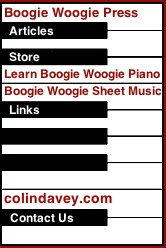Special Boogie Woogie Revival Section
Boogie woogie piano is experiencing a growing revival. Boogie woogie and blues piano festivals take place annually in Paris, France; Hamburg, Germany; and the American cities Cincinatti, Detroit, and Ann Arbor. The origins of this revival can be traced to the early 1970's.
This special section of the Boogie Woogie Press website explores the history of this revival. It features contributions from Axel Zwingenberger and Charlie Booty, both major participants in the revival from its origins in the early 70's to present. Axel's and Charlie's contributions represent the European and American perspectives, respectively. Paul Martin has also contributed an article on his work, with Ron Harwood, on a major documentary on boogie woogie history. Paul and Ron are also prime movers behind the American boogie woogie festivals.
After the original boogie woogie craze of the the late 1930's and early 1940's, the public interest in boogie woogie virtually disappeared. This was despite the major influence that the style continued to exert over jazz, blues, rock-and-roll, and rhythm-and-blues.
According to Axel Zwingenberger, during the "dead" period between 1945 and 1970-something, boogie players in Europe were "singular performers". Similarly, according to Charlie Booty, until the American enthusiasts started meeting each other in the early 70's, they "had each been living in a world with only 1 boogie player."
1974, in Cologne Germany, the very first boogie woogie/blues piano festival took place. At about the same time, the American enthusiasts started discovering each other, and having annual piano parties. The public interest in the music has been growing ever since.
Further evidence of the revival can be seen in the successful publication of two major books on boogie woogie history: A Left Hand Like God by Peter Silvester (1988) and Boogie Woogie Stomp - Albert Ammons And His Music by Chris Page (1997).
In this spirit, work has now begun on a major documentary on the history of boogie woogie piano. Ron Harwood recently founded The American Music Research Foundation, a non-profit foundation for the purpose of producing this documentary. Paul Martin, one of the producers, in his contribution to this section, describes the story behind the documentary.
And now, the articles:
An Interview with Axel Zwingenberger
Rent Party Echoes: The Role of the Louisville, Dallas, Fort Worth, Evansville Piano Parties in the History of Boogie Woogie Piano As Seen by Charlie Booty
The Masters-of-Boogie-Woogie Documentary Project by Paul Martin
